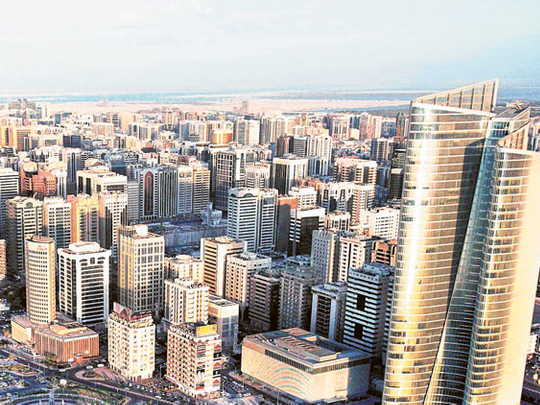
Abu Dhabi: Abu Dhabi's economy witnessed 15.9 per cent growth last year, according to a report published by the Statistics Centre Abu Dhabi (Scad) Tuesday.
The report, which is from the Statistical Yearbook of the Emirate of Abu Dhabi 2011, also said that a number of indicators show the capital's economy has overcome the repercussions of global financial downturn.
The emirate's economy posted record gains of Dh85 billion last year, which saw the GDP at current prices grow to Dh620.2 billion, up 15.9 per cent from Dh546.5 billion, it said.
The contribution of oil to Abu Dhabi's GDP was 49.7 per cent last year, while non-oil sectors have witnessed a noticeable increase of 5.6 per cent, the report said.
Scad's Statistical Yearbook 2009 reported oil's share in Abu Dhabi GDP as 49 per cent.
Abu Dhabi had previously laid out plans to diversify its economy and reduce its dependence on oil as its main source of funding. It is estimated that this contributed 44.6 per cent to the emirate's GDP in 2009, the document stated.
"From what we gather, oil production was roughly flat in the UAE in 2010, so most of the nominal value added increases are attributed to the rise of oil price," said Giyas Gokkent, group chief economist at the National Bank of Abu Dhabi.
Abu Dhabi, one of world's major oil producers, on an average produced 2.3 million barrels per day of crude oil and 4,847 million cubic feet of natural gas per day last year, the report said.
There's no doubt that the economy is diversifying and non-oil activity is picking up, which is clear if you look at its performance over the past few years, Gokkent said.
Fluctuations
However, the fluctuations of the oil prices year to year will have an effect on how much the contribution of the oil sector is within nominal GDP, he said.
So in other words, the higher the oil prices go, the higher its contribution to the GDP and vice versa.
Abu Dhabi's nominal GDP is forecast at $197 billion this year, Gokkent said. "Higher oil price will be a driver in 2011 growth as well as higher output [total UAE oil production during January-April 2011 estimated up 7 per cent year on year] and modest pick-up in non-oil activity," he said. UAE economy expert Mohammad Al Asoomi told Gulf News that the non-oil sector "is picking up well".
"There are many heavy investments happening in that area," he said. "There are heavy investments in the petrochemicals field in Ruwais for instance, heavy investments in aluminium."
Most recently, Emirates Aluminium, also known as Emal, announced its plans to spend $4.5 billion (Dh16.51 billion) to double its output in the used metal industry.
"That's in addition to services, telecommunication, trade, etc. This means that the diversification is important," he said.
Refining capacity
Today, Abu Dhabi is ranked sixth worldwide in terms of proven oil reserves, and accounts for 8 per cent of Opec's production.
It has also been ranked seventh worldwide in terms of natural gas reserves.
There are two refineries in Abu Dhabi, with a combined refining capacity of 600,000 barrels per day.
There are plans to build a third refinery in the emirate of Fujairah with a capacity of 300,000 bpd.
Abu Dhabi has become a very attractive place for businesses and investors, the Scad report said.
Investment statistics for last year show that the total number of registered business reached 96,381, of which 10.4 per cent were newly licensed, compared with 86,402 in 2009 of which 14.7 per cent were licensed during the same year.
When asked about this year, Al Asoomi said that the year will most probably witness a high GDP growth rate. "With high oil prices and so much investments in other sectors, this year will certainly see more growth on all levels."
Consumer price rise tops 3%
Consumer prices in Abu Dhabi soared by more than 3 per cent last year with housing, utilities and food and drink leading the way.
A report from Statistics Centre Abu Dhabi (Scad) revealed that inflation in Abu Dhabi was 3.06 per cent last year, driven by price increase in several sectors including housing, water, electricity, gas, food, non-alcoholic beverages and fuels.
This year the Ministry of Economy has said that the inflation is likely to come down to as low as 1.5 per cent.
However, Scad's statistics have shown consumer prices increased 2.4 per cent on the year in June, an increase of 0.5 per cent compared to May. Inflation has been rising steadily, which has been putting pressure on the government to take action.
Since the beginning of the year, the Ministry of Economy had introduced cap on prices of certain products, which they hope will result in more competition and eventually a fall in food prices.













